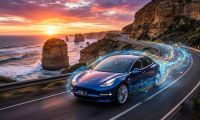High Interest Rates Equals High Cost of Financing Car Loans
There was a Twitter spaces discussion with Elon Musk and a variety of Tesla investors and influencer's today and it was eye opening. One of the confusing points that is taking place is why high interest rates are hurting Tesla.
One reason this happens is because with higher interest rates, the risk free rate of return on a U.S. Treasury goes higher and starts to get close to what a standard S&P 500 index offers. When this is the case, people sell stocks and buy treasuries. It's simple math.
But, there is a second reason this hurts Tesla and not just stocks in general. Higher interest rates hurt Tesla because it is like raising the price on Tesla vehicles without Tesla's permission.
Right now, interest rates are going higher and if you try and order a Tesla online, you will get a rate of about 5.3% on a 6 year loan. When I ordered my Model 3 RWD, I got a 4.2% rate and that was 4 months ago. Unless you can buy the car with cash, which most people can't, you will need to take out a loan to get the car.
This means the price of any Tesla vehicle is higher now than it was 4 months ago, even if Tesla did not raise the prices of its vehicles. The price is higher because you are paying higher interest to whoever you are getting the loan from. Therefore, Tesla will likely have to LOWER prices in a higher interest rate environment in order to compenstate from this stealthy price increase.
You may also be interested in:
- Tesla's production crisis in China.
- Tesla Cybertruck will benefit from 1 MW charging speeds.
- The staggering economics of the Tesla semi.
Examples of Higher Interest Costing Tesla
Let's take a simple example. Imagine the days where interest rates were 2% to get a car loan. Those were the good old days. Now they are over 5%. We'll take a 6 year loan on Model 3 costing $50,000, with $5,000 down. That's a $45,000 loan. We'll look at 2%, 3%, 4%, and 5% and see the total price increase in each case:
2% Loan
Payment Every Month: $663.77
Total of 72 Payments: $47,791.43
Total Interest: $2,791.43
Principal Total: 94%
Interest Total: 6%
3% Loan
Payment Every Month: $683.72
Total of 72 Payments: $49,227.51
Total Interest: $4,227.51
Principal Total: 91%
Interest Total: 9%
4% Loan
Payment Every Month: $704.03
Total of 72 Payments: $50,690.39
Total Interest: $5,690.39
Principal Total: 89%
Interest Total: 11%
5% Loan
Payment Every Month: $724.72
Total of 72 Payments: $52,179.98
Total Interest: $7,179.98
Principal Total: 86%
Interest Total: 14%
As you can see, each 1% increase in interest rates adds about $20 in monthly payments and about $1,500 to the total cost of the vehicle. Raising rates from 2% to 5% adds $60 in monthly payments and $4,500 additional cost to the vehicle. This isn't trivial.
Growth stocks and companies whose customers use debt to buy its products, like any automotive company, including Tesla, will get hurt by this and projections will be that higher rates will slow demand due to costs increasing.
Of course, Tesla can and should lower prices if demand starts to take a hit. Tesla has such great margins on its products that it can afford to lower prices. This explains why Tesla stock and other automotive and EV stocks like Lucid and Rivian and NIO have been taking such a big hit lately.
Leave your comments below, share the article with friends and tweet it out to your followers.
Jeremy Johnson is a Tesla investor and supporter. He first invested in Tesla in 2017 after years of following Elon Musk and admiring his work ethic and intelligence. Since then, he's become a Tesla bull, covering anything about Tesla he can find, while also dabbling in other electric vehicle companies. Jeremy covers Tesla developments at Torque News. You can follow him on Twitter or LinkedIn to stay in touch and follow his Tesla news coverage on Torque News.
Set Torque News as Preferred Source on Google











